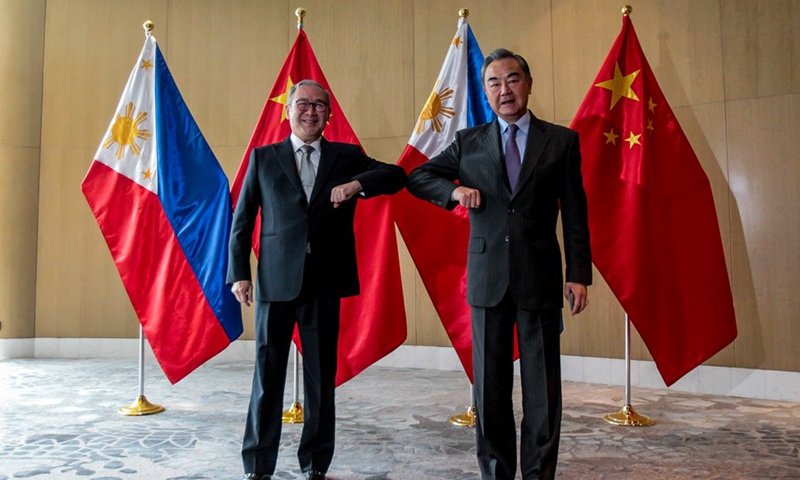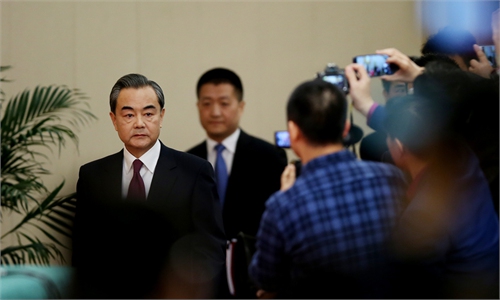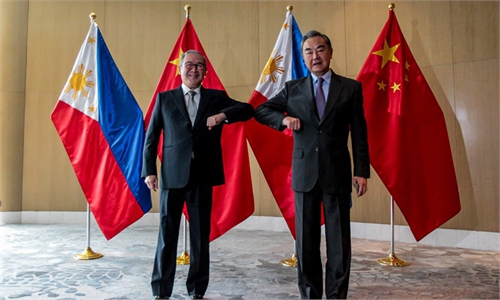China-Philippines ties can overcome US factor

Chinese State Councilor and Foreign Minister Wang Yi (R) meets with Philippine Foreign Secretary Teodoro Locsin in Manila, the Philippines, Jan. 16, 2021. (Xinhua/Rouelle Umali)
Chinese State Councilor and Foreign Minister Wang Yi on Saturday wrapped up his official visit to the Philippines.This visit has ramped up mutual political trust between the two countries. The Philippines has been one of the worst-hit countries by COVID-19 in Southeast Asia. According to a statement from the Philippine Foreign Affairs Department, Wang on Saturday pledged to donate 500,000 vaccine doses to the Philippines. China lent a helping hand to assist the Philippines' fight against the pandemic despite the great demands at home. This truly demonstrates its sincere friendship with the Philippines.
Regarding the future of bilateral ties, cautious optimism is a proper position to take. Since President Rodrigo Duterte took office in 2016, Manila's ties with Beijing have turned around, consolidated, and been promoted to new levels. Manila will usher in a new president in 2022, which may somewhat affect its relations with Beijing. However, no matter who takes office, cooperation should be the mainstream of ongoing China-Philippines ties. Divergences between them can be managed and tackled by bilateral exchanges.
Washington is a factor which cannot be neglected in terms of Beijing's relationship with Manila. The US has been the only military ally of the Philippines, which is deeply influenced by the former in terms of politics and culture. China should calmly deal with this US factor in its relations with the Philippines, neither exaggerating nor overlooking it.
The policies of the Biden administration are expected to become more pragmatic than Trump's transactional tantrums. Biden is clearly aware of international affairs, and his foreign policies are anticipated not to lead to a lose-lose situation.
Biden has vowed to strengthen the US' alliance system. Philippine Foreign Affairs Secretary Teodoro Locsin tweeted on Monday, saying, "He'll [Biden] be known as genuinely the most caring US president." Washington's ties with Manila may to some extent improve after Biden takes office. Yet it does not mean the improvement will neutralize China's friendship with the Philippines. Under a Biden presidency, China and the US are projected to engage in both competition and coordination. With controversial issues between Beijing and Manila, Biden's policies will probably be more flexible.
When it comes to the South China Sea, Wang said it is an inescapable issue the two countries face, but it is by no means a deadlock. Locsin said this issue is just a lone pebble in the broad avenue of bilateral relations.
The South China Sea issue is only part of China-Philippines relations. It's an issue left over by history between China and its neighboring countries, including the Philippines. This makes this issue complicated and sensitive.
Both countries should be wary of coping with their differences toward the South China Sea. They should carefully work with other ASEAN members to reach a deal on a code of conduct (COC). They can forge a workable scenario recognized by regional countries. This plan should adhere to international law to manage and control their divergences. As such, it will be a vital approach to safeguard peace and security in the disputed waters. Furthermore, the completion of the COC will be conductive for the regional countries to expand their cooperation in domains including fisheries and the exploration of oil and gas. However, regional countries should not be blindly optimistic toward the COC, as it can only manage and control, not resolve all divergences.
The peace and stability of the waters are consistent to the common interests of all regional countries, but Washington holds a different position. The US believes so-called freedoms of navigation and overflight are in line with its national interests, and it has repeatedly engaged in relevant operations. Biden is expected to continue the claims of such freedoms to strengthen US presence in the South China Sea. As talks over the COC enter a critical stage, Washington will continue to make waves in the region.
In this context, China should promote COC negotiations as scheduled. Additionally, it should be made clear that the completion of the COC will not affect any freedom of navigation and overflight - as long as they are kept within the boundaries of international law. The US should not try to meddle with the negotiations of the COC, nor rope in its allies and partners, such as Japan, Australia, and India, to conduct military drills in these disputed waters. None of such petty actions will help to ease the situation or contribute to the peace and stability of the South China Sea.
The author is director of the Center for Southeast Asian Studies at the Chinese Academy of Social Sciences in Beijing. opinion@globaltimes.com.cn


